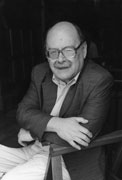
Edward James Olmos
[Photograph: External Source]
Edward James Olmos was born on February 24, 1947 into a Mexican-American family in California. Raised in Los Angeles, he dreamed of becoming a professional baseball player. While that did not happen, he burst onto the rock scene as a teenager and even enjoyed some fame in the local nightclubs around town.
Olmos says he identifies as being a “chicano” in his heart and his Mexican roots are strong. His great grandfather was the well-known Mexican journalist Enrique Flores Magón who, along with his siblings, participated in the uprising against the dictatorship of Porfirio Díaz and was one of the founders of the Mexican Liberation Party.
Enrique Flores Magón who, along with his siblings, participated in the uprising against the dictatorship of Porfirio Díaz and was one of the founders of the Mexican Liberation Party.
Olmos’s acting career began in small productions until he landed a part in “Zoot Suit” as El Pachuco, through which he reached Broadway and was eventually nominated for a Tony Award
Following his successful incursion into theater, several more films followed, such as “Wolfen,” “Blade Runner” and “The Ballad of Gregorio Cortez.”
En 1984 he starred in his biggest role to date as the taciturn police Lieutenant Martin Castillo in the TV series “Miami Vice.” His performance earned him a Golden Globe and an Emmy.
In 1988, he became the first American-born Latino to receive an Oscar nomination for his role in “Stand and Deliver” where he portrayed real-life math teacher, Jaime Escalante, who turns his students into math geniuses despite their underprivileged backgrounds.
Later, he had roles in films and TV series such as “Selena,” “The Wonderful Ice Cream Suit,” “Battle Star Galactica” and, more recently he played in the “Dexter” saga as James Gellar, a former Tallahassee University religion professor who is obsessed with the Bible and its apocalyptic connotations.
Edward James Olmos is an actor and film producer with an impeccable career. As a Latino, he is committed to social causes, especially those affecting the Latino community in the United States. An example of this is his creation and founding of Latino Public Broadcasting which funds public television programming that focuses on issues affecting Latinos as it advocates for diverse perspectives in public television.
Olmos is also known for his frequent visits to reformatories and juvenile detention centers where he speaks to young people about the dangers of continuing the lifestyles they are involved in and that landed them behind bars. Olmos is also an international ambassador for UNICEF.
Enrique González Macho
Enrique González Macho was born in 1947 in the autonomous community of Cantabria (Spain). He studied at the French Institute in Madrid and received a degree in architecture and economics. His career as a producer began with films such as “Éxtasis”, “Malena es un hombre de tango”, “Lisboa”, “Flores de otro mundo”, “La noche de los girasoles” and “Te doy mis ojos.” In 1976, he acquired Alta Film Production Company and later became owner of the Renoir Cinema chain. He recently began to operate the online film website, Filmin.
Cinema chain. He recently began to operate the online film website, Filmin.
En 1998 he received the National Film Award and was named a Caballero de la Orden de las Artes y Letras [Gentleman of the Order of Arts and Letters] by the French government, in recognition of his support for European cinema.
Mr. González Macho was elected president of the Spanish Academy of Arts and Sciences on April 11, 2011. The website of this institution defines him as one of the most prominent and militant defenders of Spanish cinema and, in general, of independent film.
González has held polemical positions on the role that Internet and film should play in film projection. In his speech at the 2012 Goya Awards, he said, "Internet is not an alternative nor a substitute, not even a complement, to the enormous economic effort necessary to produce film.”
This vision, criticized by the Internet Browsers Association, was defended by González Macho in July of this year when he refuted, "let’s see if there is anyone who will get behind these new platforms like I have. I am the founding partner of Filmin and there must be a good reason why we put this company together. There are many modern young people who talk a lot but don’t do anything. Then they blame us old timers for being ‘archaic’ but we’re the ones who are supporting these new platforms.”
The economic crisis affecting some European countries has also put
González Macho in a strategic position lately among those with the conviction that cinema and filmmaking must be defended as a necessary instrument for the future. Budget cuts by the current Spanish government in the area of culture have pushed the envelope to an impossible point, he contends. He warned that Spanish cinema is at a breaking point.
Manuel Pérez Estremera
Manuel Pérez Estremera (Madrid, 1944) began his writing career in the film magazines “Film Ideal” and “Nuestro Cine.” He also participated on the creative team of “Cuadernos para el diálogo,” collaborated in theater magazines such as “Primer Acto” and works in the theater book collection section of “Cuadernos para el diálogo”. He has been connected to TVE (Spanish National Television) since the 1960s where he worked on numerous series and  programs. He was the director of “Fila 7,” a weekly film program; co-director of external production in which he dealt with film scripts and projects for Spanish cinema, co-productions from Latin America and Spanish and European producers for Spanish TV. He held this position from 1987 to 1992. He has also held executive positions in the Sogecable group as Director of Mega-film Programming and Programs for Self Production until April 2004 and purchasing Film Rights for Antenna TV. Likewise, was the director of the San Sebastian Film Festival for two years and was on the Festival’s Board of Directors until 1997.
programs. He was the director of “Fila 7,” a weekly film program; co-director of external production in which he dealt with film scripts and projects for Spanish cinema, co-productions from Latin America and Spanish and European producers for Spanish TV. He held this position from 1987 to 1992. He has also held executive positions in the Sogecable group as Director of Mega-film Programming and Programs for Self Production until April 2004 and purchasing Film Rights for Antenna TV. Likewise, was the director of the San Sebastian Film Festival for two years and was on the Festival’s Board of Directors until 1997.
Manuel Pérez Estremera, whose film and television activity dates back to the 1960s, was responsible for the lecture department of the International Film and Television School of Los Baños, Cuba between 1998-2000.
He has written four books on film: “Correspondencia inacabada con Arturo Ripstein”, “Nuevo Cine Alemán”, “Nuevo Cine Latinoamericano”, and “Problemas del Nuevo Cine.” The last three were published in the 1970s.
He held the post of Director of Cinematography for the Ministry of Culture of Spain, from May to December 2004. His latest post was Director of TVE, between January 2005 and January 2007.
He is an honorary member of the Argentine Academy of Film. He received the Coral of Honor at the 28th Annual Havana Film Festival and recognition from the Latin American Film and Audiovisual Producers Federation (FIPCA in Spanish) in December 2006 for his “decisive contribution to the development and consolidation of Latin American film.”
His awards and tributes include the “City of Huelva” in 2007, homage at the Festival of Lima (Peru) 2007 and homage at the Latin American Film festival of Lleida, 2008.
He was a juror at film festivals in Havana, Guadalajara, Gramado, Lleida, Toulouse, Tarifa among others.
On this opportunity, the 6th edition of the Dominican Global Film Festival would like to add this notable Spaniard to our list of artists being recognized for his important work in the scenic and cinematic arts.
Luisito Martí
Luis Bernardo Martí Hernández, better know as Luisito Martí (1945 - 2010), was a Dominican comedian, producer and television presenter. He was known for his film role as Balbuena, a dreamer who dreamed of going to New York.
Luisito Martí began as a musician, drummer and singer with the Johnny Ventura band then shortly thereafter achieved fame with such songs as “La Muerte de Martín,” “Que pasa Papo,” and “Te digo ahorita.” These songs should have earned him gold records due to their high sales. Another of his hits was “Mama es la que sabe” among many others. The majority were songs from his personal inspiration with a humorous edge that ended up defining this genre.
de Martín,” “Que pasa Papo,” and “Te digo ahorita.” These songs should have earned him gold records due to their high sales. Another of his hits was “Mama es la que sabe” among many others. The majority were songs from his personal inspiration with a humorous edge that ended up defining this genre.
Luisito Martí was the MC at the performances of the Orchestra, always injecting humor to the great delight of the crowds. These early performances were precursors to his later successful career as a comedian and TV and film star in the Dominican Republic. In 1976, he formed his own orchestra called the Sonido Original which quickly achieved success with such tunes as “Gato entre Macuto,” “Jaleo de Acordeón,” “El mudo,” and many other musical pieces.
In 1983, he became part of the comedy program, “Show del mediodía,” and soon after became the show’s director. It was during this time that Luisito Martí created his most representative humorous characters: Casimiro Valdez, Belarminio, Cabrera Moquete, El chino Bichan, Leo, Don Efraín, El cubano, Lamparita, Filomeno, Leyito and Balbuena. The impact and popularity of these characters won him many prizes such as Comedian of the Year, Best Comedy Show, Best Night Club Act, among many others.
Balbuena, Martí’s signature character in the film “Nueva Yol”, is a fundamental piece of Dominican and Latin American film history. This film broke all box office records and became the standard for the booming film industry of the Dominican Republic.
Omar de la Cruz, Director of the Dominican Global Film Festival, points out that Luisito Martí’s character, Balbuena, is known by millions of people in many countries around the world and that Luisito Martí’s participation in “Nueva Yol” gave the Dominican Republic a place among the stories and
films about immigration around the world.
For this reason, the Dominican Global Film Festival, in its sixth year, is paying tribute to Luis Bernardo Martí Hernández, one of the best-loved characters in the world of Dominican entertainment. We render homage to his work, his dedication and his human qualities.
Sandra Condito
Photograph: Lali Marte
Has over 16 years experience in development, production, publicity and marketing in the entertainment industry. While working on the varied campaigns of award-winning features, controversial films, and box office successes for Miramax / Dimension Films, Condito’s strengths caught the attention of the prolific filmmaker: Robert Rodriguez and his producing partner Elizabeth Avellán of Troublemaker Studios.
filmmaker: Robert Rodriguez and his producing partner Elizabeth Avellán of Troublemaker Studios.
A major powerhouse for Dimension, Rodriguez and Avellán handpicked Sandra to act as their primary liaison for every facet of production and publicity. While building the Troublemaker brand, where she fostered Rodriguez’s career and movies for over 12 years, Condito was integral in the production and success of The SPY KIDS Franchise, ONCE UPON A TIME IN MEXICO, and SIN CITY among others, later expanding her role with GRINDHOUSE where she developed and executive produced the double feature. Condito went on to produce the acclaimed SECUESTRO EXPRESS, nominated for the British Independent Film Awards’ Best Foreign Film and Venezuela’s highest grossing movie to date.
Condito most recently produced the indie feature BLACKTINO, an official selection of 2011 SXSW and winner of the Best Director Award for HBO’s New York Latino International Film Festival. Condito is currently developing an untitled family feature film, a genre film called THE HOME, and an English adaptation of BRING ME THE HEAD OF MACHINE GUN WOMAN. Condito is also consulting with Lionsgate’s Hispanic Division, Pantelion, spearheading successful campaigns for GIRL IN PROGRESS, starring Eva Mendes, Will Ferrell’s CASA DE MI PADRE, as well as upcoming releases AZTEC WARRIOR and Diego Luna’s directorial debut, CHAVEZ.
Born into a multicultural Dominican/Italian family and raised in the Dominican Republic, the bilingual Condito attended New York University where she studied liberal arts and also holds a Masters in Education.










